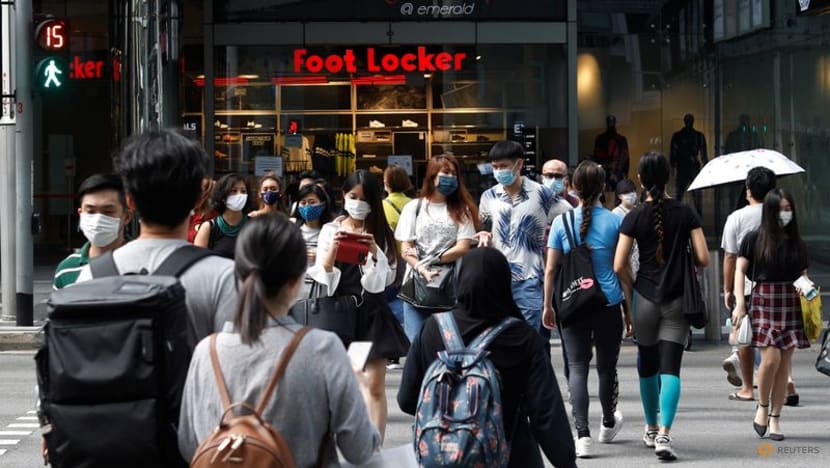Singapore's COVID-19 wave past its peak, cases fall to 3,000 per day: Ong Ye Kung
The proportion of seniors who have kept up to date with vaccinations is falling, says the Health Minister, warning this could weaken the population’s resilience to COVID-19.

Shoppers wearing protective face masks cross a street in Singapore's Orchard Road shopping district during the coronavirus disease (COVID-19) outbreak in Singapore, August 17, 2020. (File photo: REUTERS/Edgar Su)
SINGAPORE: The current COVID-19 wave peaked two weeks ago and cases have fallen to around 3,000 a day, said Health Minister Ong Ye Kung on Tuesday (May 9).
This is down from an estimated 4,000 infections a day last month.
Giving an update in parliament, Mr Ong said more than 300 COVID-19 patients are currently hospitalised and the number should fall in the coming weeks.
Although this is a fraction of the figure at the peak of the pandemic crisis, Mr Ong said it still added a “significant workload” to hospitals.
The key strains circulating are XBB.1.9, XBB.1.16 and XBB.2.3, with each accounting for about a quarter of all infections, he said.
While the World Health Organization (WHO) re-designated XBB.1.16 - also known as Arcturus - to a “variant of interest” in April, Mr Ong noted that there is no evidence, internationally or locally, that any of the variants has a clear growth advantage over the others or can lead to more cases of severe illnesses.
He added that the Ministry of Health (MOH) will continue to closely monitor the characteristics of the variants.
KEEP VACCINATIONS UPDATED
Fewer seniors are keeping up to date with their COVID-19 shots, Mr Ong said as he reiterated the importance of vaccinations in protecting against severe illness.
Among people aged 60 and above, the proportion who have kept up to date with their vaccinations has fallen to 50 per cent, down from 58 per cent at the beginning of this year.
"There is a common thinking amongst seniors and amongst the public, that ‘I seldom go out of my home, and hence I need not take further vaccinations.’ This is not recommended,” he said.
“The current Omicron variants are highly infectious, and we no longer impose social restrictions which means even if you do not go out of your home, it can find its way to your home, through visiting family members or anyone you may come into contact with,” he added.
Noting that some seniors may be reluctant to continue their vaccinations due to concerns about the risk of side effects, the minister said the incidence of severe adverse reactions is very low in Singapore, at about seven in 100,000 doses.
With the latest bivalent mRNA formulations, this is even lower at one in 100,000 doses, he added.
Mr Ong warned that if the trend of falling vaccinations continues, it could weaken the population’s resilience against COVID-19 over time and make it vulnerable to the virus again.
“The benefits of the COVID-19 vaccines continue to far outweigh the risks, and you should keep your vaccination updated,” he said.
“This is the recommendation of both the Expert Committee On Covid-19 Vaccination and the Health Sciences Authority."
MYOCARDITIS
Responding to questions from Member of Parliament Tan Wu Meng (PAP-Jurong) about myocarditis or heart inflammation after COVID-19 vaccination, Mr Ong said there were 160 reports of myocarditis and pericarditis linked to the vaccines as of Apr 27.
This is out of over 17 million COVID-19 vaccine doses administered in Singapore.
Of the 160 cases, he said 32 per cent had initial symptoms reported within one day of vaccination, another 20 per cent reported within two days and another 24 per cent reported within one week.
"The majority of cases of myocarditis from vaccination are generally mild and respond to treatment," Mr Ong told the House.
He added that as of Apr 27, about 340 applications for the Vaccine Injury Financial Assistance Programme (VIFAP) were cardiology related. The scheme provides a one-time financial assistance to people who experienced serious side effects that are assessed by a doctor to be related to COVID-19 vaccines administered under Singapore's national vaccine programme.
Eighty-one of the applications were approved and financial assistance has been extended to the applicants, he said.

















